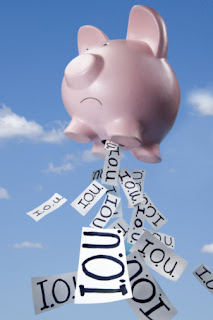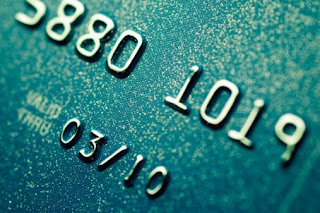Experiences Using a Non-Profit Debt Management Program
 Calling a debt management program (DMP) was a low-point in my life. Newly divorced with more than $15,000 in credit card debt, I didn't trust anyone - not my ex-husband, not my credit card companies (who had come after me ruthlessly despite my very decent credit history), not my divorce attorney, not myself. I certainly didn't trust that the automated phone system at a debt management program called Consumer Credit Counseling Services (CCCS) would help me get out of this terrible financial situation.
Calling a debt management program (DMP) was a low-point in my life. Newly divorced with more than $15,000 in credit card debt, I didn't trust anyone - not my ex-husband, not my credit card companies (who had come after me ruthlessly despite my very decent credit history), not my divorce attorney, not myself. I certainly didn't trust that the automated phone system at a debt management program called Consumer Credit Counseling Services (CCCS) would help me get out of this terrible financial situation.But I had to try something! My creditors' calls wouldn't stop. The operators, I could tell, were getting ever more professional sounding, higher and higher up in collections at the banks I was dealing with. I had to find a way to restore order to my life - even if it was going to be a new order that I wasn't happy about having to live with.
Consumer Credit Counseling set up an appointment for me with one of their representatives, and I arrived at their satellite office near my home to find a friendly, polite, young man named Gerald waiting to discuss my findings with me. He was sympathetic. He listened as I described my situation. He said to me, "You can do this. You can get out of debt." He added something comforting like, "It happens to the best of us."
He explained to me the terms of "joining" CCCS: I had to divulge all my debts to them as well as tell them about my income and monthly expenses. Based on that information, they would negotiate with my creditors for lower interest rates and lower monthly payments. They would encourage my creditors to stop harassing me. Usually, Gerald said, it worked. I would stop getting harassing phone calls from creditors. This was the good part.
There were more terms, however. I would have to pay CCCS an initial fee, which I think was around $50. After that, I would have to pay them $24 a month for as long as I was on the program. They would need my checking account number because they would automatically withdraw my monthly payment (in my case it was $360 per month), then they would distribute it out to my creditors. Late payments or insufficient funds could mean getting dropped from the program.
And, perhaps most significantly, as long as I was on CCCS's program, I could not have a credit card or apply for a line of credit. Car loans were an exception.
I was hesitant to sign on. After all, I told myself, I didn't have a credit card problem - that problem had belonged to my ex-husband. My problem wasn't overspending, it was trusting the wrong man. The thing was, though, I was the primary card holder on our accounts, and I was therefore held legally responsible for the debt. I was the one who faced harassing phone calls daily. I was the one who, frankly, cared. I didn't want to go forward in life with a terrible credit record and debt up to my eyeballs. So, umm... I did have a credit card problem no matter what the source. And, I wanted my creditors' calls to finally, finally, stop.
I signed on.
With the help of the debt management program, Bank of America agreed to reduce an interest payment on a very high balance from 23% to 8%. HSBC reduced the interest on a card I had with them from 12% to 0%. And, Cox Communications, a cable/ phone company with whom I had an outstanding balance of $550, agreed to accept a monthly payment of just $20 as long as it came through the Debt Management Program. I had tried negotiating with all these creditors myself with no luck - the DMP did so easily and the harassing phone calls stopped.
I made my monthly payments. I never missed one, even though it was really hard sometimes. I lived without the convenience of a credit card for more than two years. While I was on the program, I also strove to make extra payments to my largest credit card balance (Bank of America), using the debt management program to keep me in good standing and generally on track, but exceeding their expectations by paying down the big debt.
(Gerald, by the way, told me I shouldn't have paid the extra money to the credit card balance, but used it to start a savings/ emergency fund - was this good advice or did he just want me to keep paying CCCS $20 a month? I'm not sure. I will say that every single person who I ever spoke to at CCCS, by phone or in person, treated me with kindness, compassion, and respect. I never heard a derogatory word or had the horrible experience of calling during business hours and being unable to reach a real person. Overall, I'm thankful to the company for their support.)
Finally, I was able to pay off almost all of the debt and a family member lent me the last few thousand so that I could go off the debt management program. I wanted to rejoin the world of credit - and reestablish myself as a good credit holder. I expected credit card offers to come pouring in to me. They haven't. I'm not sure if it's because I was on a debt management program or if it is because in the current economy banks simply aren't extending credit to new/ risky customers. I did finally procure a credit card, but it has a limit of just $500 and an annual fee of $39. (So... six months off the program and I'm $39 back in credit card debt, already... without even making a purchase.)
If you are considering a debt management program (DMP), here are some points to consider:
- It should be a not-for-profit organization and the monthly fee should not be above $40.
- You should be able to make extra payments to your credit card accounts at your convenience without going through the DMP.
- You should be able to go off the program at any time you choose, with no penalty from the DMP itself. (Your credit card companies may punish you - for example, when I went off the DMP, my one card with a remaining balance went from a 0% interest rate - negotiated by the DMP - to an interest rate above 30%.)
- You should be treated respectfully every time you call to speak to a representative at the DMP.
- They can only help you as much as you are willing to commit to helping yourself.
The Federal Trade Commission has also posted information for consumers about using Debt Management Programs effectively and about how to know if the program is legitimate. Link to that information here.
Labels: Consumer_Credit_Counseling_Services, debt, debt_elimination, debt_management, debt_management_program, debt_relief, Olivia_Sage
|
--> www.FedPrimeRate.com Privacy Policy <--
CLICK HERE to JUMP to the TOP of THIS PAGE --> SITEMAP <-- |















